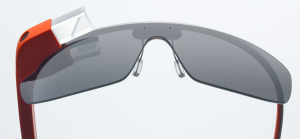 Doctors, forensic scientists, and police officers have been early adopters of Google Glass as a way of collecting data, of recording events that matter to their professional practice. This recording device is double edged: on the one hand they make the transmission of surveillance data incredible easy (maybe too easy), but on the other hand the data might be used to evaluate the performance of the surgeon, physician or police officer wearing them. So personnel evaluation might evolve with a data record of actual performance ~ you can see the quality of the surgery performed or the propriety of an arrest.
Doctors, forensic scientists, and police officers have been early adopters of Google Glass as a way of collecting data, of recording events that matter to their professional practice. This recording device is double edged: on the one hand they make the transmission of surveillance data incredible easy (maybe too easy), but on the other hand the data might be used to evaluate the performance of the surgeon, physician or police officer wearing them. So personnel evaluation might evolve with a data record of actual performance ~ you can see the quality of the surgery performed or the propriety of an arrest.
Some evaluators spend considerable time in programmatic contexts collecting observational data. One wonders if recording devices that just come along with us and record what is going on might be useful for evaluators. For example, the GoPro, strapped to your head or chest, is now standard equipment for sports enthusiasts to capture their accomplishments or nature enthusiasts their surroundings. It might well be the means to record that program activity or meeting, but it might also be a bit intrusive.
Google Glass is definitely more stylish, less obtrusive, and provides interactive capabilities. It’s in the beta stage, what Google calls the Explorer Program and if a space is available you could be an early adopter for the cost $1500, that is if you live in the USA. In short you tell it what to do, take a picture or video, which you can share, send a message, look up information. The example below shows some of its capabilities. Imagine an evaluation context that would allow you to record what you see, do and to share and connect with program stakeholders.
Google Glass has been controversial when people wear them as a matter of course in their daily lives creating exaggerated tensions in an already surveillance rich society (smart phones being the obvious device). But used in an evaluation context, where people have accepted that events, interactions, and talk will be recorded, these controversies might be obviated.
 Follow
Follow

While Google Glass has the potential to be an incredible tool for measurement and evaluation, the possibility of everyday use in most or all common environments seems unlikely. Aside from personal privacy issues, professional privacy and the risk of leaking confidential information makes it highly unlikely that Google Glass could be welcome in banks, many businesses, and even business-oriented bars and restaurants. Knowing that the business meeting you’re having could be picked up and transmitted by the person next to you is already a possibility with cell phones. It would seem like someone using discreet glasses to also pick up visuals as well as audio would be a very strong deterrent for professionals visiting any of these environments. Even in the medical field, where they could be incredibly beneficial, there are risks of violating HIPPA or increasing malpractice suits – a common reason people and cameras are often already not allowed in certain areas of hospitals. It seems fairly impossible to separate the beneficial data from the litigious, financial and privacy risks.
Beth… I wasn’t suggesting google glass as an everyday data collection that people wear, but rather a data collection device used in the context of evaluation. Just like we use audio recorders, for example, and people know we are recording for the purpose of data collection. The device has some issues to be sure, but I think simply dismissing it is a bit of an over-reaction.
Yes, I am agree with your view. Google Glass is definitely more stylish, less obtrusive, and provides interactive capabilities.